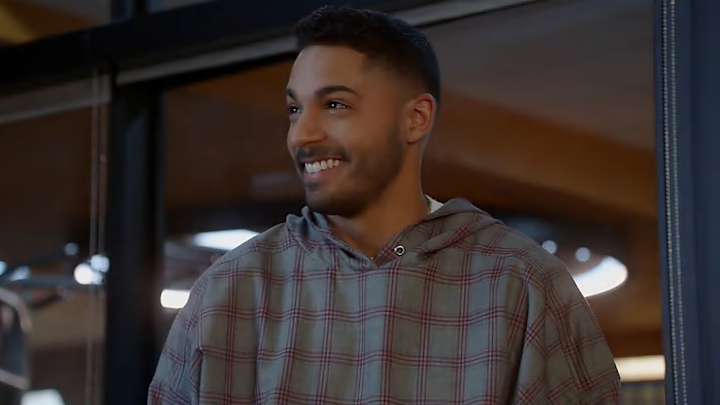The revelation that KJ is related to the Baker family is meant to be a big one, but having the truth come from the discovery of a revenge plot masterminded by KJ's briefly appearing grandfather only hurts the narrative. KJ's grandfather had been referenced a few times previously as a bad father who had a negative impact on Cassius while he was growing up, but had never appeared on screen until All American deemed it time to show that KJ's grandfather was Billy Baker's half-brother. His anger and desire for vengeance come from a long-ago formed belief in his head that had his biological mother not given him up to the foster system, that he could have grown up to be as successful as Billy had. The argument comes at the expense of disregarding that at the time of her first pregnancy, she was a teenager who likely would not have been able to provide KJ's grandfather with the same life that eventually resulted in Billy's success in the first place. She was at a very different point in her life at the time, not that KJ's grandfather ever tried to view this pregnancy from her perspective.
KJ's grandfather's motivation is small, and has the negative effect of making Cassius's anger toward Jordan even worse. Cassius is not even the one with the personal vendetta against the Baker family, which would have at least justified his anger more. Instead, Cassius is a pawn, manipulated and brainwashed since childhood to hate the Baker family, while his father viewed him as a disappointment. KJ's grandfather wants to prove a point, as if to show that he never should have been given up because he was the better child. Except, anyone he would want to prove this point to, such as Billy or their shared biological mother, has passed away. What is the point of undergoing this revenge plan now? What was the true endgame supposed to be?
The emotional connection to this plot line flows entirely through KJ. Does he tell Jordan the truth? KJ is out of his depth on this one, not knowing what to do or how to handle the situation, as it is likely the last thing he expected to be told. KJ's instinctual reaction to leave his father and stay with Amina is fairly predictable, and fits perfectly into Tori's previous claims that at his emotional low when needing a confidant, KJ runs to Amina. While Tori does not appear in "No Role Modelz," All American never suggests that KJ ever replied to her text messages about KJ standing her up after the game. While he had a lot going on in his mind at that time, any attempts KJ may potentially make toward salvaging a romantic relationship between them may be out of the question at this point, and if anything, KJ should focus on trying to retain his friendship with Tori in any future meetings he may have with her. KJ's primary focus between the two girls continues to be Amina, and any attempt KJ makes to claim otherwise just suggests that All American is digging its heels too strongly into the idea of a love square when this situation exists as a triangle.
The other central emotional plot of the episode surrounds Khalil's relationship with his father. Jordan throws Khalil a surprise birthday party, but the bigger storyline element comes from Khalil trying one more time to have a relationship with his father while making it clear that he wants to stay with Jordan and Layla. Jordan and Layla have provided Khalil with a healthier, more stable environment and support his growth rather than trying to drag him down into things that could prevent him from moving forward in life. While it is not entirely clear or confirmed who nearly killed Jordan toward the end of the episode, Khalil's horror and guilt, as well as Khalil's decision to stay with the Bakers, imply the idea that Khalil's father may have been behind it, even if he did not personally attack Jordan.
While "No Role Modelz" does the work to try and enhance an emotional connection to KJ and Khalil through these storylines, it continues season seven's trend of throwing its remaining original characters to the side in ways that hurt their characters and plot lines. All American's more recent decision to only have Jordan and Layla appear in alternating episodes, rather than appearing together, is a boggling creative choice. As the married couple of the series, they are one of the biggest anchors to connecting what All American used to be. Their marriage should have been one of the center points of the plot, seeing how it grows as they do, and finding storylines that allow their relationship to strengthen. They could have done that when Khalil moved into the house, by showing Jordan and Layla try to work through being foster parents together, and how they discover what it means to take care of a teenager on the cusp of adulthood. Instead, while their alternating appearances do not hurt their marriage, it is frustrating to try to justify why only one is there at a time.
Meanwhile, not only is Coop's relationship with her professor also ignored, but so is her growth in law school. All American's seventh season has been fairly consistent about the main storylines of its new additions, but it plays fast and loose with the storylines of its original leading cast. Doing so not only hurts the storylines but also the audience's experience watching the show. New additions are welcome, but not allowing the series to be anchored by familiar faces prevent season seven from being a cohesive season of television with an ensemble cast, and instead comes across as watching several different shows at once, and for longtime fans, the storylines they wish to follow are never front and center.
